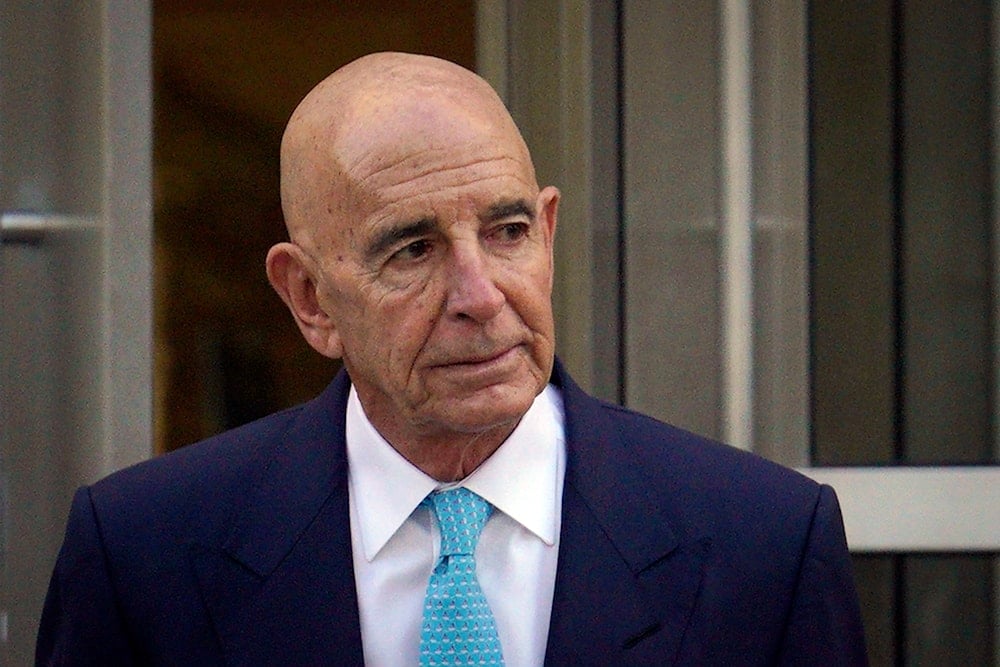'Era of Western interference is over': US special envoy for Syria
Tom Barrack announces a major shift in US Syria policy, ending Western interference and calling for regional cooperation and diplomacy.
-

Tom Barrack exits Brooklyn Federal Court on Friday, October 21, 2022, in New York, United States. (AP)
US Ambassador to the Republic of Türkiye and Special Envoy for Syria Tom Barrack declared the end of Western interference in the Middle East, urging a regional approach to rebuilding Syria and signalling a major US policy shift toward diplomacy and local partnerships.
In a post on X, Barrack slammed the British-French Sykes-Picot agreement, pointing out that it "divided Syria and the broader region for imperial gain, not peace," emphasizing that the deal was a mistake that affected generations and the US won't "make it again."
"The era of Western interference is over," the US envoy declared, adding that "the future belongs to regional solutions, but partnerships, and a diplomacy grounded in respect."
A century ago, the West imposed maps, mandates, penciled borders, and foreign rule. Sykes-Picot divided Syria and the broader region for imperial gain—not peace. That mistake cost generations. We will not make it again.
— Ambassador Tom Barrack (@USAMBTurkiye) May 25, 2025
The era of Western interference is over. The future…
Barrack quoted US President Donald Trump from his May 13th address in Riyadh, "Gone are the days when Western interventionalists would fly to the Middle East to give lectures on how to live, and how to govern your own affairs."
Working with the region key in Syria's rebirth
He highlighted the growing regional cooperation between the US and key players, such as Turkey, the Gulf, and even Europe, focusing on the diplomatic nature of this cooperation.
"Syria’s tragedy was born in division. Its rebirth must come through dignity, unity, and investment in its people," he said, noting that the first steps to this "rebirth" are "truth, accountability, and working with the region, not around it."
The US further emphasized a shift in approach, stating that America now stands with Türkiye, the Gulf, and Europe, not through military deployments, paternalistic rhetoric, or imposed borders, but in direct solidarity with the Syrian people themselves.
Barrack claimed that the collapse of the al-Assad regime has created an opportunity for peace and emphasized that by lifting sanctions, the international community can empower Syrians to seize this moment and begin rebuilding their nation toward lasting stability and economic recovery.
The US envoy's post comes as the United States moves toward friendlier ties with the new Syrian administration, a move beginning with a comprehensive lifting of sanctions on Damascus.
US formally lifts sanctions on Syria, aiming for reconstruction
The United States on Friday lifted comprehensive economic sanctions on Syria, opening the door for foreign investment and reconstruction efforts following the collapse of the Bashar al-Assad government.
The move formalizes a decision previously announced by US President Donald Trump during a regional tour that included meetings with Turkish and Saudi leaders. Trump described the sanctions as "brutal and crippling" and said their removal was in response to demands from regional partners seeking stability and reconstruction in post-war Syria.
“Syria must continue to work towards becoming a stable country that is at peace, and today’s actions will hopefully put the country on a path to a bright, prosperous, and stable future,” said US Treasury Secretary Scott Bessent in a statement.
The US Treasury outlined its conditions for this sanction-lift, emphasizing the protection of minorities and cautioning against letting Syria become a hosting ground for what it considers "terrorist organizations".
Conditions and cautions
According to the US Treasury, the relief is contingent upon Syria preventing the use of its territory as a "safe haven for terrorist organizations" and ensuring protections for ethnic and religious minorities.
Although the Trump administration’s decision has received cautious praise from some Western analysts and Arab governments, others have raised concerns over the speed of reintegration and the risks of premature economic normalization.
Still, proponents argue that reconstruction is critical to regional stability and that continued sanctions would only prolong humanitarian suffering.

 4 Min Read
4 Min Read








